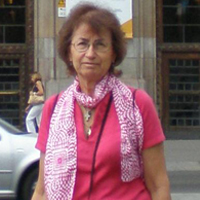Eliza Kitis (Elizabeth Koutoupi-Kitis) holds an MA in Linguistics, University of Essex, and a Ph.D. in Linguistics, University of Warwick. She has been Professor of Linguistics at the School of English, Aristotle University of Thessaloniki, Greece. She studied initially in Greece, where she got a BA in English Language and Literature (recipient of state studentship IKY due to coming first in entrance exams and on merit thereafter during all four years of her studies), and during her residence in UK she obtained her other two degrees. Her 1982 University of Warwick Ph.D. thesis (under David Holdcroft’s supervision) Problems connected with the Notion of Implicature was supported by a three-year major state scholarship awarded on merit at her MA graduation by the Department of Education and Science, UK.
The thesis was a major and at the time the most comprehensive critique of Grice’s Program of Logic and Conversation. The notion of conversational implicature was redefined in terms of intentionality and the principle of relevance, which was identified as dominant in this type of implicature and in communication. Many instances of Grice’s conversational implicature were found to be just contextual assumptions ordinarily surrounding speech-events, often explainable in terms of knowledge frames and scripts. It was argued that the notions of ‘frame’ and ‘script’ (as borrowed from cognitive science at the time) played a paramount role in communication, structuring underpinning background knowledge, and that implicature had to be ‘liberated’ from such contextual assumptions. Conventional implicature was also discussed and criticized. The thesis can claim a pioneering role (very early in the day), not only in positing the maxim of relevance as the major determinant of implicature, but also in showing how insights from various trends emerging at the time in other disciplines can be brought to bear on the analysis of implicature and on pragmatics in general. The thesis uses concepts and tools from the burgeoning fields at the time of cognitive science (e.g., frames, scripts, knowledge representation theories) and conversation analysis (ethnomethodology).
Eliza’s teaching and research have reflected her special interests in semantics, pragmatics and discourse analysis as well as CDA. At the Department of English, Aristotle University she designed, introduced and developed core courses such as intros in linguistics I and II, semantics, pragmatics, and discourse analysis. She has also offered courses on connectives and subordinators of English and Modern Greek, discourse markers and particles at graduate level at other Departments and/or inter-departmental graduate programs. Her research has been published in various journals and as book chapters. She is also the author of the textbook Semantics, Meaning in Language. She was vice-director of the Language Centre for Foreign Language Teaching (LANCE) at Aristotle University for most of the noughties. She served as country research team leader of COST Action IS0703 (genres/academic writing in Europe’s HE). She sits on the editorial boards of journals, while she is on the international board of reviewers for various other journals and international conferences (e.g., Journal of Pragmatics, Erkenntniss, Pragmatics and Society, ICCLA, AILA or for EU Programs), as well as on promotion review committees internationally. She has taught at the graduate programme of the Dept of English in Kent State University, Ohio. Additionally, she spent quite a few semesters and academic years as a visiting scholar at various Universities, mainly in the UK (e.g., Leeds, Cambridge).
Her skills extend to language teacher-training, various fields in applied linguistics such as EAP, intercultural pragmatics, inter-language pragmatics (ILP, ELT), interethnic communication (ESOL), semantics-pragmatics in translation; she’s an expert in the field of discourse markers and connectives (theoretical and applied), multimodality (advertising /logo/cartoon /political discourse, journalese), but also in (Critical) Discourse Analysis/Studies (CDA/CDS); additionally, as a pragmatician and specifically involved in the field, she has expertise in the language impairment of autistic individuals (semantics, primarily pragmatics in ASD/ASC).


